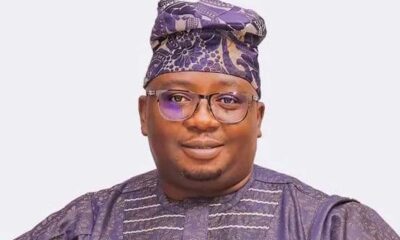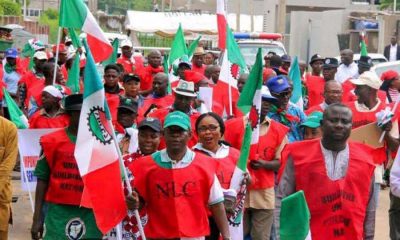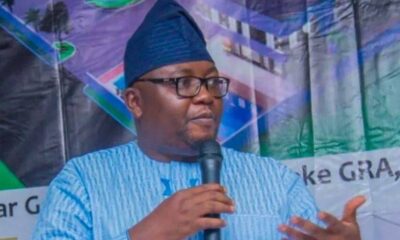Business
Electricity tariff hike: Labour, Discos on collision course

Electricity tariff hike: Labour, Discos on collision course
The Nigeria Labour Congress, power distribution companies, and the Nigerian Electricity Regulatory Commission are heading for a collision course over the planned hike in the tariffs payable by electricity consumers nationwide.
Although power distribution companies and the NERC have not officially confirmed the planned increase, the Multi-Year Tariff Order of the regulator, which explains tariff reviews in the sector indicates that electricity tariff is meant to be reviewed every six months.
This implies that the tariff being paid by power users currently, will be reviewed and a new tariff will take effect from July 1, 2023.
In reviewing the tariff, based on MYTO, the NERC considers various economic factors. They include inflation rate, foreign exchange rate, available power generation capacity, gas price, and, capital expenditure adjustment.
Operators project that the high rate of inflation, coupled with the recent floating of the naira against the dollar, among other factors, will lead to an estimated rise of about 40 per cent in electricity tariff by July 1, 2023, should the MYTO be implemented.
READ ALSO:
- ‘Japa’ good for Nigeria, says Peter Obi
- FG releases 10 high-yield crop varieties to farmers to enhance food sufficiency
- Naira drops further against the dollar; exchanges at N765.13
Reacting to this, the NLC, on Thursday said the plan to increase electricity tariff by 40 per cent by July 1 “was both insensitive and callous and reflects an organised indifference to the wellbeing of consumers, especially, the poor ones.”
NLC kicks
The NLC President, Joe Ajaero, stated that the massive increase was explained away as a response to the over 100 per cent increase in the pump price of Premium Motor Spirit, popularly called petrol.
“Details reveal a movement in inflation from 16.9 per cent to 22.41 per cent (threatening to needle at 30 per cent), and a shift in the exchange rate from N441 to N750 (per dollar).
“We believe that not even these figures are a justification for this reckless proposed tariff increase. The issue of capacity to pay and quality of service delivery is not only germane but superior to any rationalisation by market logic,” Ajaero stated in a statement from the labour union.
He also pointed out that the service providers in the power sector were performing far below expectations, and accused power distributors of hiking tariffs surreptitiously.
He added, “The service providers in spite of sundry support have not been able to meet the threshold of 5,000 megawatts. Coupled with this, there have been surreptitious increases without notice in violation of statutes.
“The inherent risk in the new regime of tariff is that there is no control, implying that by August, consumers will pay new rates. The other risk is that by the time other products or service-rendering entities come up with their new prices or rates, the ordinary person would have been compacted into dust.
“We would want to advise the apostles of the market who have called the NLC all sorts of names to check their conscience. The rate at which they are going is highly combative and combustible,” Ajaero stated.
READ ALSO:
- Lagos State govt, Sanwo-Olu gifts N10m to LASU’s best graduating student
- African Countries Suffering Debt Hangovers – Macron, UN
- Saudi Arabia’s lavish recruitment drive rolls on despite Messi miss
He noted that with contemplation of payment of school fees in tertiary institutions and increases in privately-owned ones, in addition to other costs and tariffs on the way, “life in Nigeria could truly be Hobbesian.”
He said, “The market economies which the market fundamentalists seek to emulate, have in place socio-economic safeguards which we do not have. In light of this, our advice is that this proposed tariff hike should be shelved for our collective safety.”
NERC’s tariff adjustments
The NERC is responsible for regulating electricity tariffs in Nigeria, as it periodically reviews and adjusts this based on various factors such as inflation, exchange rates, gas prices, and the cost of operating the power sector.
It introduced the Multi-Year Tariff Order, which is aimed at ensuring cost-reflective tariffs in the Nigerian electricity market. Under the MYTO, electricity tariffs are scheduled to increase gradually over time to cover the actual cost of generating and distributing electricity.
The commission, for instance in its MYTO 2022, explained that in line with the subsisting MYTO methodology, some indices with potential impact on electricity rates were considered, adding that these indices would be reviewed every six months.
“These indices shall be reviewed every six months to update the tariffs with changes in the indices as applicable in line with the MYTO methodology,” the regulator stated in MYTO documents issued to Discos.
The indices identified in the MYTO 2022 document include Nigeria’s inflation rate, foreign exchange rate, the United States’ rate of inflation, available generation capacity, gas price, CAPEX (capital expenditure) adjustment, as well as other changes.
READ ALSO:
- (BREAKING)Eid-El-Kabir: There are plans to attack worship centres, other – DSS
- Police Invite ‘Trinity Guy’ for asking minor about penis colour in video skit
- Pastor in court for allegedly defrauding Landmark varsity
However, the MYTO methodology met with mixed reactions from Nigerians. While some argued that it was necessary to improve the financial viability of the power sector and attract investments, others expressed concerns about the impact of tariff hikes on consumers, particularly in terms of affordability.
It must be noted, however, that electricity distribution companies play a role in the implementation of electricity tariffs. They are responsible for billing customers and collecting payments for electricity consumed. The Discos also bear the brunt of customers’ reactions when tariff adjustments are made.
Discos await NERC
The Executive Director, Research and Advocacy of the Association of Nigerian Electricity Distributors, Sunday Oduntan, told our correspondent that Discos would only act based on instruction from NERC.
Oduntan, who initially insisted on not commenting on the matter, refused to confirm whether Discos had been given the go-ahead to hike the power tariff beginning from July 1, 2023.
“The people to be called on tariff are those in NERC, not us. I cannot explain to Nigerians because I am not the regulator. It is the regulator that determines tariffs by looking at the indices of the economy, not us.
“We also wait on them. Anything to do with tariffs is determined by the regulator and not the operators,” he stated.
When asked whether the NERC had given the Discos the approval to raise the tariffs, Oduntan replied, “When they tell us to do this, then we follow that instruction.”
NUEE opposes hike
But the acting General Secretary of the National Union of Electricity Employees, Dominic Igwebuike, said any move by Discos or the NERC to hike tariffs would be resisted by electricity workers.
READ ALSO:
- Notorious gang leader, Kabir Bala gun down hours after Kogi govt revoked his pardon
- Residents shot dead, houses burnt as gunmen invade Kogi in fresh attack
- Foreign investors may return as FG plans forex injection into economy
He stated, “We are just yelling over the more than 100 per cent increase in petrol price, now they are talking about a 40 per cent increase in electricity tariffs. Can you imagine that? And this is about the sixth time they are increasing it since the sector was privatised.
“The NUEE condemns it in totality. It is unacceptable and it shows that the government does not care about the feelings of the poor masses. They are not talking about increasing generation capacity but raising tariffs. It is very sad,” he said.
Speaking on what the union would do if the Discos should implement the proposed hike, Igwebuike said, “We want to see what will happen. If it comes to that, we are going to know what to do. We are going to consult ourselves to see the next line of action if that is done.”
The NERC, however, did not comment on the issue, as its spokesperson, Usman Arabi, said he was out of the country, while other officials at the commission refused to speak on the matter when contacted.
But the Chairman of the Lagos State chapter of the Nigerian Association of Small and Medium Enterprises, Solomon Aderoju, in an interview with The PUNCH, said any increase in electricity tariff would spike production costs and consequently exacerbate the plight of the MSMEs.
He said, “It is going to cause problems in the MSME environment because it is going to increase the cost of production. We are facing very tough times now because of what is happening with petrol and diesel.
“Even the exchange rate is gargantuan now. This electricity tariff hike is going to lead to an increase in the cost of production and already, our cost of production is too much to bear. Unfortunately, the cost of borrowing is also high. The MPR (monetary policy rate ) is now 18.5 per cent. No MSME can thrive under these circumstances. The rate of inflation is 22.41 as of today. MSMEs are facing very turbulent times now.
On his part, the Deputy-President of the Lagos Chamber of Commerce and Industry, Gabriel Idahosa, rejected the proposed hike, noting that it would negatively impact the productive sector of the economy.
Idahosa said, “ How can they do that? Industries are already coping with so many dimensions of inflation in costs. This will be another heavy layer on them. It is going to be a serious burden to the issues that businesses are already facing.”
READ ALSO:
- FG cannot afford to take additional loans, DMO warns
- Two-year-old boy accidentally shoots and kills his pregnant mother with gun left on nightstand
- Eidel-Kabir: Subsidy removal, naira devaluation hike Ram price
Similarly, the national Vice President of the Nigerian Association of Small-Scale Industrialists, Segun Kuti-George, condemned the proposed hike. He, however, stated that if the hike is accompanied by increased supply that would drive down the reliance on alternative energy sources for production needs, the productive sector of the economy would be better for it.
Meanwhile,, persons living with disabilities have called on the Lagos State Governor, Babajide Sanwo-Olu, to help them in order to mitigate the effect of the proposed hike.
They also called on the All Progressives Congress-led Federal Government to come to their immediate rescue.
The PWDs made the call through a foundation for persons living with disabilities, Kehinde Oshilaja Foundation, on Thursday.
In a statement in Lagos, the coordinator and founder of the foundation, Kehinde Oshilaja, appealed to Sanwo-Olu and the Federal Government “to assist the people living with disabilities and, indeed, over 22 million residents of the state” and provide “other avenues that would mitigate the effect on people if eventually implemented.”
Oshilaja was quoted as saying, “Let our kind-hearted governor of the aquatic splendour avail the masses, particularly, people living with disabilities with some measures that would cushion the effect on us.
“Also, let me use this opportunity to inform our loving governor that the said issue, if actually implemented, would no doubt affect the majority of the people living with disabilities and, indeed, the poor masses of Nigeria.”
He noted that “only one per cent of the people living with disabilities are working, while 99 per cent will be in a dilemma because there won’t be anyone to help.’’
Electricity tariff hike: Labour, Discos on collision course
Auto
Appeal court takes over NURTW case as NIC withdraws

Appeal court takes over NURTW case as NIC withdraws
The National Industrial Court has withdrawn from a case involving Alhaji Najeem Usman Yasin, Board of Trustees chairman of the National Union of Road Transport Workers (NURTW), and Alhaji Tajudeen Ibikunle Baruwa’s ambition to return as president of the union over lack of jurisdiction.
The industrial court’s decision was made to avoid conflict with the Court of Appeal, where the matter is already being heard.
Before the NIC announced its decision to hands-off the case, the defendants’ counsel, Mr. O.I. Olorundare SAN, had informed the court that the matter is currently before the Court of Appeal, Abuja division, and that the industrial court could not continue to adjudicate on the same matter.
The counsel cited authorities to support his claim, adding that the National Industrial Court does not have concurrent jurisdiction with the Court of Appeal.
The presiding judge, O.O. Oyewunmi, struck out the case, stating that the Appeal Court had taken over the matter and that the Industrial Court must respect the hierarchy of courts.
Alhaji Yasin and six others took the case to the Appeal Court, challenging the decision of the industrial court recognising a delegates’ conference held on May 24, 2023, where Baruwa was proclaimed as President of the union for a second term in office.
With the latest NIC judgement, both parties will now proceed to defend their positions at the Court of Appeal and await the final judgement.
Business
Multichoice shuns court order, proceeds with increase of DSTV, Gotv packages
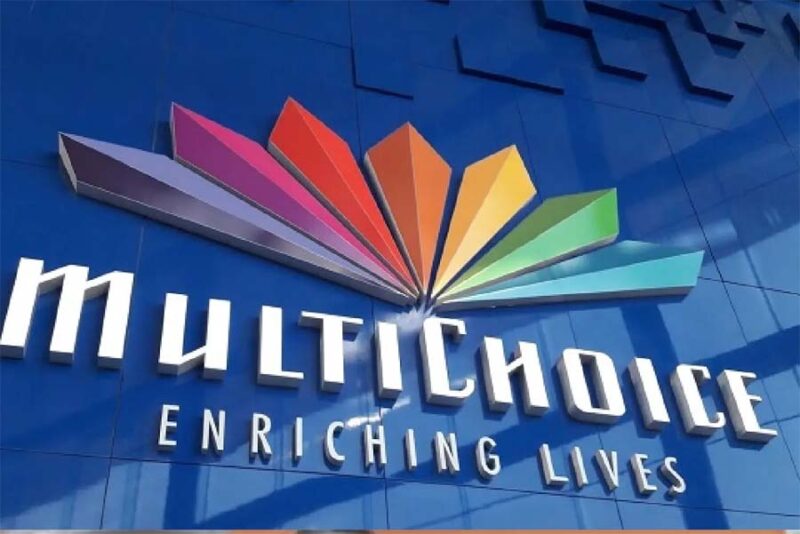
Multichoice shuns court order, proceeds with increase of DSTV, Gotv packages
Despite the intervention of the CCPT, Multichoice Limited has proceeded to increase packages price for DSTV and GOTV as announce on Wednesday last week.
Newstrends had earlier reported that the corporation announced that the new rates will go into effect on Wednesday, May 1, 2024, in a statement.
Meanwhile, on Monday, MultiChoice Nigeria Limited was ordered by the Competition and Consumer Protection Tribunal (CCPT) in Abuja to suspend the planned prices and tariffs hike on packages and services.
READ ALSO:
- Ogun frees 49 inmates to decongest prisons
- JAMB, NCC in talks to produce special SIM for students
- Labour-FG face-off imminent as NLC rejects new salary increase
The three-member tribunal, presided over by Saratu Shafii, gave the interim order following an ex-parte motion moved by Ejiro Awaritoma, counsel for the applicant, Festus Onifade.
News prices includes: DStv, Premium bouquet, the price moved from N29,500 to N37,000; Compact+ from N19,800 to N25,000; Compact from N12,500 to N15,700; Confam from N7,400 to N9,300, among others.
For GOtv users, Supa+ increased from N12,500 to N15,700; Supa moved from N7,600 to N9,600; Max from N5,700 to N7,200; Jolli, from N3,950 to N4,850, among others.
Multichoice shuns court order, proceeds with increase of DSTV, Gotv packages
Business
As controversy over Maersk-FG port investment rages, Onanuga says no $600m deal signed
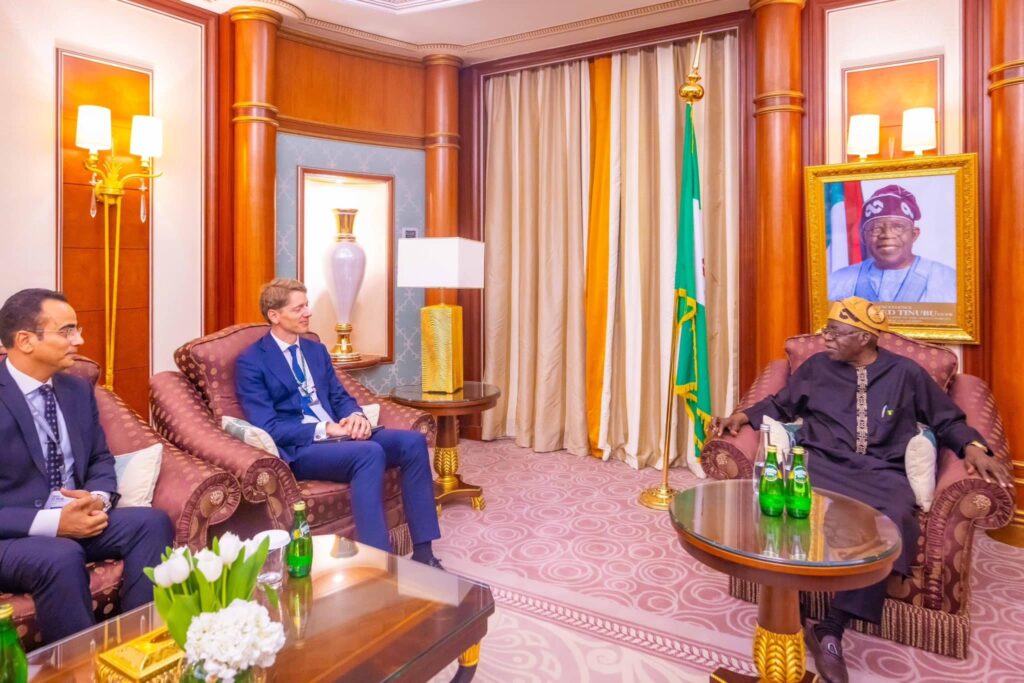
As controversy over Maersk-FG port investment rages, Onanuga says no $600m deal signed
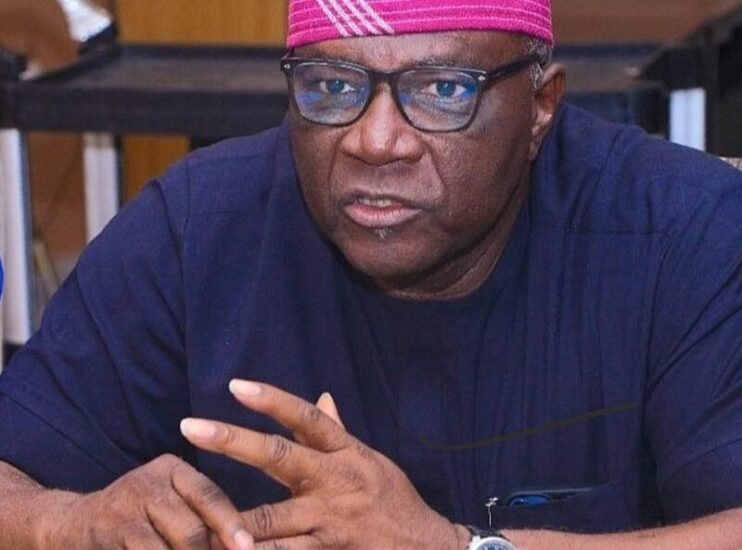
The Nigerian government and a shipping giant, Maersk, have not signed any investment agreement, Bayo Onanuga, special adviser on information and strategy to President Bola Tinubu, has said.
Onanuga was reacting to the controversy surrounding the reported sealing of a $600 million deal for the development of the nation’s seaports.
He said there was only talk “of possible investment in Nigeria” by Maersk.
Interestingly Onanuga had hinted about the deal in a tweet said to have been pulled down after the social media backlash.
After President Tinubu’s discussion with Maersk’s Chairman Robert Uggla on April 28, on the sidelines of the World Economic Forum Special Meeting in Riyadh, Saudi Arabia, the presidency had released a statement announcing that the shipping company had pledged to inject $600 million into the Nigerian seaport industry.
“Danish shipping company, A.P Moller-Maersk plans $600m investment in Nigeria. Danish shipping and logistics company A.P Moller-Maersk has disclosed a planned investment of $600 million in Nigeria to accommodate more container shipping services in Nigerian ports,” Onanuga wrote on X.
In a statement, Tinubu’s spokesperson, Ajuri Ngelale, also said “President Tinubu meets Chairman of Danish shipping giant Maersk, secures $600 million investment in Nigerian seaport infrastructure.” He quoted Uggla as saying, “We believe in Nigeria, and we will invest $600m in existing facilities and make the ports accommodating for bigger ships.”
In response to this. Maersk officials have denied any such agreement and stress no deals have been signed.
Onanuga in a new report by TheCable, an online news platform admitted no agreement on investment had been reached by the two parties.
“I think the statement issued by Maersk did not talk about a deal. There was no deal according to that statement that I read.
“However, there was talk of investment,” the special adviser said.
“No document or agreement was signed, so there was no deal. But there was talk of a possible investment in the country.
“So, go and read the statement again. They never said any deal was signed between the Nigerian government and the Dutch company. There was nothing like that.”
Onanuga however said the shipping company did not expressly deny that there was an investment talk.
He said people are “unnecessarily giddy over nothing.
-

 metro2 days ago
metro2 days agoLabour Day: Nigerian workers are dedicated, resilient, says NURTW leader
-
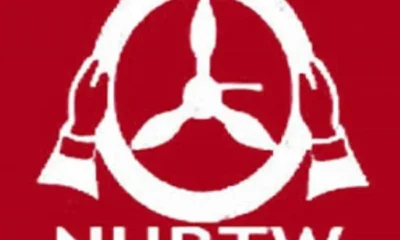
 Auto1 day ago
Auto1 day agoAppeal court takes over NURTW case as NIC withdraws
-
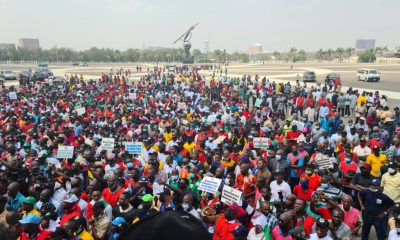
 News2 days ago
News2 days agoFG approves salary increase for civil servants, military, police
-

 News1 day ago
News1 day agoLabour-FG face-off imminent as NLC rejects new salary increase
-
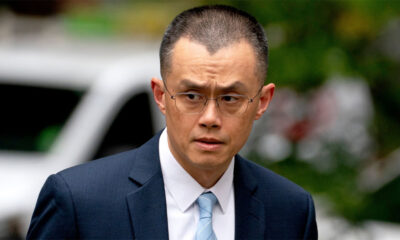
 International2 days ago
International2 days agoBinance founder bags jail term in US
-
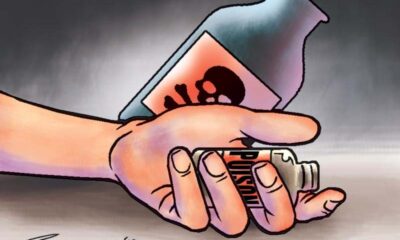
 metro3 days ago
metro3 days agoWoman arrested in Ogun after husband commits suicide
-

 metro16 hours ago
metro16 hours agoSecurity forces, vigilantes arrest kidnapper terrorising communities in Kogi
-
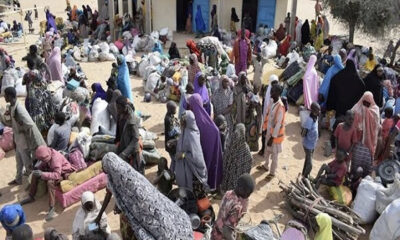
 News2 days ago
News2 days agoFG set to repatriate 20,000 Nigerians from Chad, Cameroon

